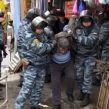
Authorities See Salafi Groups Popping Up Everywhere Inside Russia
Publication: Eurasia Daily Monitor Volume: 10 Issue: 28
By:

The Russian government has been forced to admit it is worried not only about Islam’s proliferation in the North Caucasus, but also about the proliferation of ideas of the North Caucasian militants spreading to other regions of Russia. Russian authorities are trying to prevent the spread of jihadi ideas above all in the Volga region, and regard it as the weakest link in the chain of affected areas of the Russian Federation (www.bbc.co.uk/russian/russia/2012/07/120720_rus_press.shtml). However, it would be erroneous to think that the radicals are simply concentrating on certain regions. In fact, in this time of technological breakthroughs in communications, they could be almost anywhere.
The government’s latest strike hit a Muslim group in St. Petersburg. On February 8 and 9, a large-scale police operation targeting radical Muslim groups was conducted in various parts of the city. The Federal Security Service (FSB) and police used significant manpower to carry out this operation. The building of the Main Investigative Office for St. Petersburg and the surrounding Leningrad region alone processed 271 Muslims who were arrested during the operation (www.1tv.ru/news/crime/225967). Reports of the total number of people detained varied, with some estimates as high as 700 people (www.gazeta.spb.ru/1054747-0/). This suggests that an astoundingly large police action was carried out in the city sometimes referred to as the northern capital of the Russian Federation. A police press release stated the operation was “aimed at searching for and detaining persons who may be involved in terrorist and extremist activities” (www.interfax.ru/russia/news.asp?id=289539).
Located near the Apraksin Dvor trade center in St. Petersburg, the mosque—or, rather, prayer rooms—is one of the most popular spots among migrants from Central Asia because of its convenient location. Since the mosque is close to the trade center, many Muslim traders frequently attend the house of worship. Muslim traders normally come not only from the Muslim regions of Russia, but also from the countries of the former Soviet Union. Not surprisingly, among those arrested in the February 8–9 operation were many people with expired documents who came from countries that make up the Commonwealth of Independent States (CIS) (https://news.mail.ru/inregions/st_petersburg/91/incident/11915440/). In the wake of the police raid, non-Russian citizens face deportation from the country, while Russian citizens will be screened for breaking the article in Russian criminal law on “public calls to carry out terrorist activities or public justification of terrorism” (www.fontanka.ru/2013/02/08/122/).
The fact that this mosque, which is not under the control of the Spiritual Board of Muslims of St. Petersburg, became a center for radical Muslims indicates that similar centers could also appear in any other part of Russia. Russia’s Muslim Spiritual Boards, of which there are already five, rarely reach mutual understanding on issues involving the status of this or that mosque and their radicalism. The prayer rooms near Apraksin Dvor were registered by the Union of Muftis of Russia. In this particular case, the prayer rooms were established by eastern radicals, not North Caucasians. The emergence of a powerful Tajik diaspora in the center of St. Petersburg with connections to the Near East apparently took Russian law enforcement agencies by surprise.
The authorities must have assumed that North Caucasians were also part of the St. Petersburg jamaat and that some people from this community were linked to the radical Islamists and radical underground in the North Caucasus. However, the police found little evidence of North Caucasian jihadi infiltration of St. Petersburg when they turned to the city’s North Caucasians. The arrest of Marat Sarbashev, who resided in a communal apartment, was presented as a significant police achievement. However, Sarbashev was accused merely of distributing video recordings of Islamic radicals and Islamic literature, which are outlawed in Russia (www.rosbalt.ru/piter/2013/02/09/1091993.html). Sarbashev posted this material on the Internet in 2010–2011, which makes his detention senseless.
Another alleged radical was arrested at the same time whose name was not disclosed. He also offered no resistance when taken into custody. Both of them were the only people from the North Caucasus who were arrested in the St. Petersburg operation: the rest included Uzbek, Tajik and Azeri nationals, as well as a citizen of Afghanistan and one Egyptian. Ten persons had documents with signs of forgery, while 20 others had no documents. The authorities preliminarily decided to deport seven persons. According to the head of the Coordination Council of Muslims in St. Petersburg, similar police actions take place in the city every year and end with nothing (www.kavkaz-uzel.ru/articles/219894/).
This police operation indicates that the authorities sense danger, but do not know where it is coming from. It appears that the Russian police and security services are acting blindly, using open sources on the Internet. Otherwise it is hard to explain the dissonance between the scale of the police operation in St. Petersburg and its paltry results. It is not surprising that on the second day after this police operation Russian media stopped its coverage because there was nothing of substance to report about.
Such massive special operations do the best job of putting Muslims at loggerheads with the authorities. Muslims are insulted, humiliated and accused of all mortal sins throughout these operations. The police deliberately break into prayer rooms with their dogs to desecrate Muslim prayer rugs and eventually provoke exasperation from local Muslims and are enormously counterproductive. Certainly, Moscow will experience significant blowback from the detention of several hundred Muslims detained during the February 8–9 special operation as those detained will not show any greater respect for Russia afterwards. The Russian authorities themselves are to blame for this because they refuse to get to know Islam in any other way than the one that is familiar to them. Moreover, one can be sure that these several hundred detained Muslims will also start to look for answers on the radical Islamist websites, not in the Spiritual Boards of Muslims that are under control of the authorities, as those boards cannot protect them from the government.




